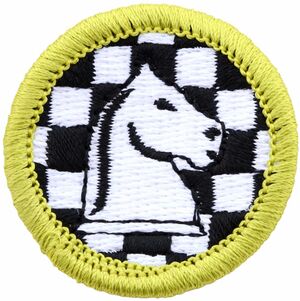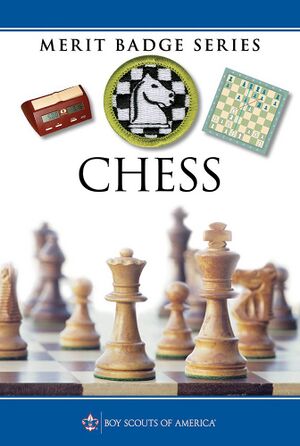Chess Merit Badge Activity Planner
| Usually the BSA awards nearly twice as many Chess merit badges as Robotics merit badges. In fact, since its introduction in 2011, Chess has consistently ranked among the 25 most popular badges — even beating out Eagle-required badges like Lifesaving. |
|---|
'Patrol Leader Merit Badge Planning Guide for the Chess Merit Badge
*** Activities for the Youth Lead Patrol ***
Exploring Chess can be a fascinating youth adventure when done right. Here are a few tips to help the patrol leader get started.
- Scouts may never add or subtract from the actual merit badge requirements
- This Planner is only a suggestion of different ideas to make working this Merit Badge both fun and easy.
- While doing the Worksheet is not a requirement for earning this badge, in many cases it can help you learn key concepts and track your progress.
A. Make Your Plan
- Merit Badge Activity Planning Tips - 14 tips for a successful patrol activity. Read carefully before you start your plan!
- Share Your Plan - Meet ahead of time with your patrol, scout leaders, parents and especially with the Merit Badge Counselor. Make changes to the plan as needed.
- Prepare Activity Flyer - Keep your fellow scouts informed - events, activities, pre-requisites and more.
| Patrol Activity | GREAT | Awesome MB to work as a patrol / Max Size 12 scouts |
|---|---|---|
| Virtual Field Trip | GREAT | Require presenter shares Chess in virtual meeting |
| Family Activity | POOR | Requires access to Chess Transmitter |
| Service Activity | FAIR | Useage in Emergency Preparedness Drills |
| S.T.E.M. Activity | GREAT | Learn how to use Modern Digital Technology |
| Field Trip | FAIR | Find a remote broadcast location |
| Duty-to-God | POOR | N/A |
| MB Day | GREAT | But only if you broadcast equipment. Many special Chess MB Day groups abound. |
| Overnighter | GREAT | Find a remote broadcast location |
| Summer Camp | GREAT | Pre-requisite: Scout Camp has their own broadcast transmitter |
Online Resources
- Chess Merit Badge Requirements: BoyScoutTrial.com lists all requirements, additional resources, activity worksheet, etc.
- Chess Merit Badge File Store: Online resources
- Chess Merit Badge Worksheets: Worksheets are optional - but highly preferred by many MBC. When you find that many requirements say "discuss" - the worksheet can help you gather your thoughts beforehand.
- Chess Merit Badge Booklet: Everything thing you need to know about Chess is right here. Get this study guide from either Amazon or your Troop Library, Merit Badge Counselor or Scoutmaster to Learn More About this Subject.
- Chess @ Simple-Wikipedia: Get the basics quickly.
B. Introduction Meeting
Most merit badge activities do best to have a "introduction" meeting where the patrol can discuss how to get started and to plan out their field trips. Send out the activity flyer in advance to use as an meeting agenda. Your scouts will then know what to expect.
News Flash
- Chess - A Merit Badge - TheBoardGameFamily.com
- Tips for Teaching Chess Merit Badge - ScoutingMagazine.com
- The Chess Kid gives Merit Badge Tips - ChessKid.com
- Chess Merit Badge - SlideShare.net - Presentation
- Chess Merit Badge - SlideServe.com - Presentation
- The Cairns Cub - All girls merit badge chess tournament (YouTube)
C. Homework / Prerequisites
Assign one or more requirements that the scout can do at home, perhaps as a family activity.
- Suggested Reading:
- Radio @ Simple-Wikipedia: Get the basics quickly.
D. Study Hall Patrol Night
While some scouts may be adept at self-study, others may do better in a small group setting and taking notes on worksheets. Make an agenda. You can facilitate discussion by asking them why each of the principles introduced here would be relevant. Schedule one or more patrol meetings to work this merit badge.
MBC Discussion Group
- Req 1: Discussion - History of Chess
- Req 2: Discussion - Sportsmanship and Game Benefits
Discussion Resources:
EDGE Demonstration Activity
Req #3: Demonstrate to your counselor that you know each of the following. Then, using Scouting's Teaching EDGE*, teach someone (preferably another Scout) who does not know how to play chess:
a. The name of each chess piece
b. How to set up a chessboard
c. How each chess piece moves, including castling and en passant captures
Chess Moves Demonstration
Req #4: Do the following:
a. Demonstrate scorekeeping using the algebraic system of chess notation.
b. Discuss the differences between the opening, the middle game, and the endgame.
c. Explain four opening principles.
d. Explain the four rules for castling.
e. On a chessboard, demonstrate a "scholar's mate" and a "fool's mate."
f. Demonstrate on a chessboard four ways a chess game can end in a draw.
Checkmate Demonstration Activity
Req #5: Do the following:
a. Explain four of the following elements of chess strategy: exploiting weaknesses, force, king safety, pawn structure, space, tempo, time.
b. Explain any five of these chess tactics: clearance sacrifice, decoy, discovered attack, double attack, fork, interposing, overloading, overprotecting, pin, remove the defender, skewer, zwischenzug.
c. Set up a chessboard with the white king on e1, the white rooks on a1 and h1, and the black king on e5. With White to move first, demonstrate how to force checkmate on the black king.
d. Set up and solve five direct-mate problems provided by your merit badge counselor.
Pre-Open Gathering Activity
A gathering activity before the official meeting start is a great way to set a fun theme for the meeting.
- Some of the items in Req #3 can be done as a pre-opening
- Some of the items in Req #4 can be done as a pre-opening
- Some of the items in Req #5 can be done as a pre-opening (Particularly item 5c or 5d)
E. Field Trip
A related field trip with the MBC will be a great time to do the second half of this merit badge activity:
F. Extra Credit
While none of these are actual requirements for this merit badge - they are terrific opportunities to show Scout Spirit, Do A Good Turn Daily and to have FUN!
- Activity Reflection: Use this meeting for scouts to ask questions and to reflect on what they gained personally from this adventure. You can also have a discussion on what future opportunities are here.
- Court of Honor Exhibit: Pictures, handiwork and other memorabilia from this adventure will make for a great presentation at the next Scout Troop Court of Honor.
Related Merit Badges
Sometimes it is easier by doing two or more merit badges together as a joint activity:
G. See Also
- 9 Things to Know about Merit Badges - BoysLife.org - There are more than 135 merit badges. By earning them, you can learn about sports, crafts, science, trades, business, and future careers. Here’s how to get the most out of your merit badge experience.



